The Bali conference is crucial for the Korowais’
The Bali conference is crucial for the Korowais’
Photos and Article by Thomas Petersson
Deep in the rainforest in the Indonesian part of New Guinea the Korowai people lives. The Korowais way of living has to a large extent been unchanged for thousands of years. Many of them still live completely on what the forest has to offer. Now their living environment has become one of the most important questions at the UN’s climate conference on Bali. Will the world’s political leaders find economical systems to limit the devastation of the tropical forests?
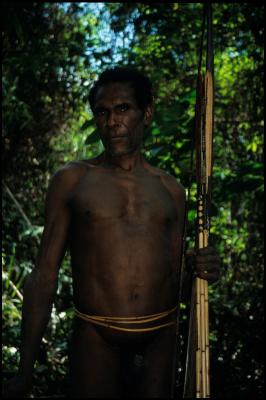
Click for big version
The Korowais have had little contact with the rest of the world. Many of them still live of what the jungle has to offer.
A misdirected cut makes the stone come off the axe and it disappears in the surrounding greenery. Soon it is found and with a skilled hand the young man binds together the stone axe again. Hardly half an hour after the sago palm is cut down. The working up of the log starts and a couple of hours later the sago flour – the Korowais’ staple food – is ready to put directly on to the fire-place.
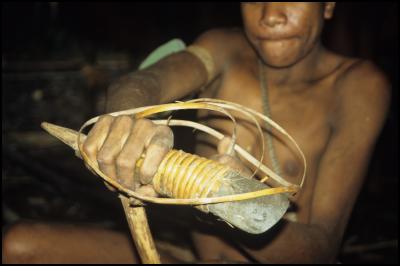
Click for big version
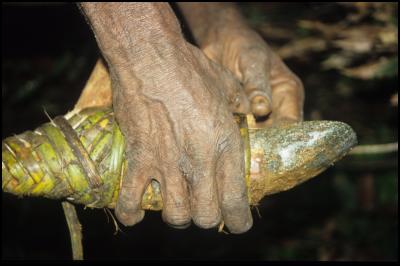
Click for big
version
Caption 4/5: The art of maintaining a stone
axe is still well-developed among the Korowai people.
One day Manu Malingatung comes to our camp in the jungle to participate in the preparations of the sago worm feast that we are invited to. He belongs to the few Korowais that have been travelling outside the Korowai lands. By walking and by canoe he went all the way to Tanah Merah, a remote penal settlement during the Dutch colonial time, nowadays the chief town of Papuan district Boven Digoel.
Boven Digoel is one of the districts that are
object to big scale plans on oil palm plantations in the
Indonesian part of New Guinea. If those plans are wholly
completed it would, according to the International Crisis
Group, lead to labour immigration of around 42 000
non-Papuans.
In a twinkling the native Papuan population
would become a minority in the district.
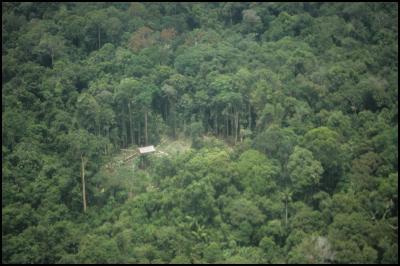
Click for big version
Caption 3: The Korowais traditionally build their houses in tree tops or around a tree, of which the upper part has been cut.
The Korean company Korindo is since a few years involved in several oil palm projects close to Tanah Merah. Lately tensions have increased between exploiters and land owners.
Manu Malingatung tells us that he saw his first car in Tanah Merah. His face shines up when he talks about it He was even invited on a ride.
- I would probably be happier there, he says.
When I ask him if he knows about Korindo and the oil palm plantations around Tanah Merah his answer is negative.
- No, I don’t know anything about that.
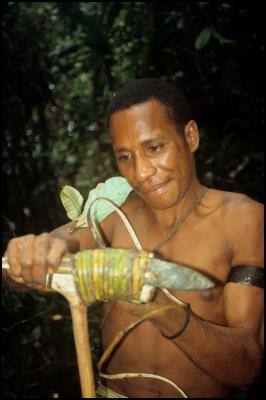
Click for big version
No, I don’t know anything about that, Manu Malingatung says when the discussion comes to oil palm plantations.
Since the 1960s’ Indonesia has ruled the western part of New Guinea with a rod of iron. The Indonesian army has been the dominating actor in the area. Having a finger in the pie in nearly all kind of economic activities, the army has also been involved in the illegal logging.
Today the rate of the deforestation in Indonesia is the fastest in the world, which has made the country to the third biggest emitter of greenhouse gases worldwide, after United States and China. However, the inaccessibility of New Guinea has preserved the rainforest of the island which today is the largest continuous rainforest area beside forests of the Amazon and the Congo basin.
The Indonesian government has during the last time more and more turned their interest from the heavily exploited islands Sumatra and Kalimatan (the Indonesian part of Borneo) – towards New Guinea and the Indonesian provinces Papua and West Papua. A greater demand for palm oil to produce biofuel has made the governing authorities in Jakarta to draw up grandiose development plans. According to a report from the International Crisis Group, the most important investments done in Papua today belong to the palm oil industry. To increase the production rate of biofuel the Indonesian government plans to exploit millions of hectares of land until 2012. If the plans are completed hundreds of thousands people will have to move to Papua in order to satisfy the need for labour to the palm oil industry.
Tropical forest replaced by oil palms means increased global warming. According to the influential Stern Review Report, deforestation is the cause of nearly twenty per cent of the global emission of carbon dioxides. This corresponds to more than all the emissions done by transports all over the world. Awareness of how the tropical forests lose their capacity to absorb carbon dioxides through deforestation has though increased. Does the rich world’s long term self-interest mean that the remaining tropical forests, at least partly, can be saved?
Demands that rich countries pay developing countries to not cut or burn down and replace the remaining tropical forests by pasture or cultivable land have increased. At the UN climate conference in Bali (the 3rd – 14th December) one of the big issues dealt with will be how to stop deforestation. Among others the World Bank will present its plans to invest in a pilot project which aims to reward developing countries who protect their tropical forests. An important issue when the Kyoto protocol will be revised is how the preservation of tropical forests could comprehend the global market for carbon credit avoidance. Today the protocol only embraces reforestation, not the protection of existing forests.
Barnabas Suebu, governor in Papua, has expressed enthusiasm in facing the possibility for Papua to earn money on big scale oil palm projects. He would like to witness increased economical growth in the province, but he also prospects other possibilities. In a recent interview in the Wall Street Journal he expressed great hopes, due to carbon credit avoidance, for the rainforest in Papua not to be devastated like in the rest of Indonesia. An upcoming controversial issue is how the rich world’s compensations should be divided. Everybody wants a piece of the cake – from big companies to governments as well as provincial and local actors.
The Korowai people’s land is situated between the Eilanden River and the Dairam River in one of Papuas least explored areas Suddenly, while sitting down to taking notes, three women appear, as from nowhere, in the dusk. Since a week we have been in the camp, situated several days’ marches from the nearest airstrip. The women tell that before they only have looked at us on distance.
Our short meeting takes place on the 25th October. A couple of weeks have passed since it was announced that Al Gore together with the Intergovernmental Panel on Climate Change (IPCC)will get the Nobel Peace Price for 2007. There is only a month until the climate conference in Bali starts.
The women look at us as if they were shy but at the same time curious. They tell, through the interpreter, that it is the first time they meet white people.
- We were afraid of coming here earlier, the oldest of the women says.
All the three of them are married, two of them mothers. I appreciate their ages between 15 and 30 years. None of them have visited Yaniruma or any of the other small villages along the Dairam River. They have not even seen the river, situated less than ten kilometres away. The women have lived their lives on the limited area of their clan. The land behind is an unknown world, a world in front of several crucial crossroads.
Our meeting only lasted a few minutes, but it goes over thousands of years of “development”. The rich consuming world, has met a more moderate world.
We have the time to exchange, it feel likes, cordial smiles. Then the women chose to leave us, almost as sudden as they did appear.
Once again they are as swallowed up by the jungle.
Thomas Petersson
Swedish journalist and the author of two books about West Papua/Papua
Facts/New Guinea
New Guinea is the world’s second biggest island.
The western part is since the 1960’s governed by Indonesia and was before that a Dutch colony.
The political status of the western part of New Guinea was decided in a very controversial referendum in 1969.
A struggle for Papuan independence has been going on since the mid 1960’s.
In 2001 an Indonesian law was adopted that gave the western part of New Guinea extended autonomy.
The eastern part of New Guinea consists since 1975 of the independent country Papua New Guinea.
(Swedish journalist and the author of two book about the indonesian part of New Guinea. Has written for leading newspapers in all the Nordic countries. Nominated to the Swedish Red Cross Prize for Journalist 2006.)


 Keith Rankin: Using Cuba 1962 To Explain Trump's Brinkmanship
Keith Rankin: Using Cuba 1962 To Explain Trump's Brinkmanship Binoy Kampmark: The Killing Of Israeli Embassy Staffers - Netanyahu’s Antisemitism Canard
Binoy Kampmark: The Killing Of Israeli Embassy Staffers - Netanyahu’s Antisemitism Canard Keith Rankin: Zero-Sum Fiscal Narratives
Keith Rankin: Zero-Sum Fiscal Narratives Eugene Doyle: Chinese Jet Shoots Down France’s Best Fighter; NZ And Australia Should Pay Attention
Eugene Doyle: Chinese Jet Shoots Down France’s Best Fighter; NZ And Australia Should Pay Attention Ian Powell: “I Can Confirm They Are Hypotheticals Drawn Largely From Anecdotes And Issues The Minister Has Heard About.”
Ian Powell: “I Can Confirm They Are Hypotheticals Drawn Largely From Anecdotes And Issues The Minister Has Heard About.” Gordon Campbell: On NZ’s Silence Over Gaza, And Creeping Health Privatisation
Gordon Campbell: On NZ’s Silence Over Gaza, And Creeping Health Privatisation